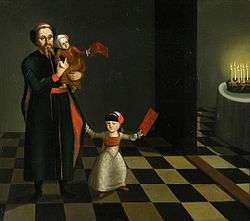Kislev
Kislev (Hebrew: כִּסְלֵו, Standard Kislev Tiberian Kislēw; also Chislev[1]) is the third month of the civil year and the ninth month of the ecclesiastical year on the Hebrew calendar. In the Babylonian calendar its name was Araḫ Kislimu.
| ← Marcheshvan Kislev (כִּסְלֵו) Tevet → | ||||
|---|---|---|---|---|
 Chanukah Chanukah, the Festival of Lights, begins on the 25th of Kislev. | ||||
| Month number: | 9 | |||
| Number of days: | 30 (sometimes 29) | |||
| Season: | Autumn | |||
| Gregorian equivalent: | November–December | |||
In a regular (kesidran) year Kislev has 30 days, but because of the Rosh Hashanah postponement rules, in some years it can lose a day to make the year a "short" (chaser) year. Kislev is an autumn month which occurs in November–December on the Gregorian calendar and is sometimes known as the month of dreams. The name of the month derives from Akkadian kislimu. But some popular etymologies connect it to the Hebrew root K-S-L as in the words "kesel, kisla" (hope, positiveness) or "ksil" (Orion, a constellation that shines especially in this month) because of the expectation and hope for rains.
In Jewish Rabbinic literature, the month of Kislev is believed to correspond to the Tribe of Benjamin.[2]
Kislev in Jewish history and tradition
- 1 Kislev (1977) - Rabbi Menachem Mendel Schneerson miraculously recovered from a devastating heart attack.
- 6 Kislev (1973) – Death of David Ben-Gurion
- 9 Kislev(1773) - Birth of the Mitteler Rebbe, the second Chabad Rebbe.
- 9 Kislev(1887 - Death of the Mitteler Rebbe,second Chabad Rebbe.
- 10 Kislev (1826) - Liberation from prison of the Mitteler Rebbe, the Second Chabad Rebbe.
- 14 Kislev (circa 1445 BC) – Death of Reuben, son of Jacob.[3]
- 14 Kislev (circa 1568 BC) – Birth of Reuben, son of Jacob.[3]
- 14 Kislev (1929) - Rabbi Menachem Mendel Schneersohn married Chaya Mushka Schneersohn, the daughter of the Sixth Lubavitcher Rebbe
- 15 Kislev (167 BC) – The Greeks set up the "Abomination of Desolation" in the Temple.[4]
- 17 Kislev (1947) – The United Nations General Assembly approves a plan for the partition of Palestine, which eventually led to the creation of the State of Israel.
- 19 Kislev (1772) - Death of the Magid Of Mezritch, successor of the Baal Shem Tov.
- 19 Kislev (1798) – Liberation from prison of Rabbi Shneur Zalman of Liadi and celebrated as Yud Tes Kislev by Chabad Chassidim.
- 20 Kislev (circa 457 BC) – Ezra addresses a three-day assemblage of Jews in Jerusalem, telling them to adhere to the Torah and to dissolve their interfaith marriages.
- 21 Kislev (circa 128 BC) – The Samaritan temple at Mount Gerizim was destroyed by John Hyrcanus I.[5]
- 25 Kislev (164 BC) – The Hanukkah miracle
- 25 Kislev (167 BC) The Greeks make pagan sacrifices in the Temple[6]
- 27 Kislev (circa 2105 BC) – Flood rains cease (According to Genesis 6–8).
References in fiction
- In the story of Xenogears, Kislev is the name of a country, named after the Hebrew month.
- In the Warhammer universe, Kislev is both the name for a city near the chaos wastes and the country in which it resides.
- In the Dragonlance universe, Kislev (or Chislev) represents the godly force of instinct.
- By Jon Stewart in "Can I Interest You in Hanukkah" from Stephen Colbert's A Colbert Christmas: The Greatest Gift of All!
References
- "Chislev". Webster's Revised Unabridged Dictionary. The Free Dictionary (Farlex). 1913. Retrieved 2011-02-07.
- "Rosh Chodesh Kislev • Torah.org". torah.org.
- Hamodia. Nov/28/12. p. D47.
- "Now the fifteenth day of the month Kislev, in the hundred forty and fifth year, they set up the abomination of desolation upon the altar, and builded idol altars throughout the cities of Judah on every side." (1 Maccabees 1:54)
- Megillat Ta'anit 29
- "Now the five and twentieth day of the month they did sacrifice upon the idol altar, which was upon the altar of God." (1 Maccabees 1:59)